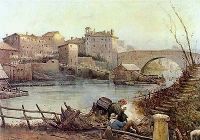Tiber: Difference between revisions
imported>Richard Nevell (Simplify) |
mNo edit summary |
||
| (One intermediate revision by one other user not shown) | |||
| Line 3: | Line 3: | ||
The '''Tiber''' ([[Italian language|Italian]] ''Tevere'', [[Latin language|Latin]] ''Tiberis'') is a [[river]] in central [[Italy]], best known as the main river of the city of [[Rome]], which was founded on its eastern banks, not far from where the Tiber joins the [[Aniene]]. | The '''Tiber''' ([[Italian language|Italian]] ''Tevere'', [[Latin language|Latin]] ''Tiberis'') is a [[river]] in central [[Italy]], best known as the main river of the city of [[Rome]], which was founded on its eastern banks, not far from where the Tiber joins the [[Aniene]]. | ||
At 406 [[kilometre|kilometres]], the Tiber is Italy's third longest river. It originates from the [[Mount Fumaiolo]] of the [[Appennine mountain range]], in the [[Province of Forlì-Cesena]] of the [[Emilia-Romagna]] region, then flows south through [[Umbria]] and [[Lazio]] (including the city of Rome and the [[Tiber Island]]). The main tributaries are the [[Chiascio]], [[Nestore]], [[Paglia]], [[Nera River (Italy)|Nera]] and [[Aniene]]. The Tiber finally meets the [[Thyrrenian sea]] at [[Ostia]], the westernmost, coastal [[Municipalities of Rome|municipality of Rome]]. | At 406 [[kilometre|kilometres]], the Tiber is Italy's third-longest river. It originates from the [[Mount Fumaiolo]] of the [[Appennine mountain range]], in the [[Province of Forlì-Cesena]] of the [[Emilia-Romagna]] region, then flows south through [[Umbria]] and [[Lazio]] (including the city of Rome and the [[Tiber Island]]). The main tributaries are the [[Chiascio]], [[Nestore]], [[Paglia]], [[Nera River (Italy)|Nera]] and [[Aniene]]. The Tiber finally meets the [[Thyrrenian sea]] at [[Ostia]], the westernmost, coastal [[Municipalities of Rome|municipality of Rome]]. | ||
[[Image:IsolaTiberinaEPonteCestioByRoeslerFranz.jpg|thumb|200px|Isola Tiberina E Ponte Cestio, a 19th century painting by Roesler Franz]] | [[Image:IsolaTiberinaEPonteCestioByRoeslerFranz.jpg|thumb|200px|Isola Tiberina E Ponte Cestio, a 19th century painting by Roesler Franz]] | ||
| Line 10: | Line 10: | ||
==Notes== | ==Notes== | ||
{{reflist}} | {{reflist}} | ||
[[Category:Suggestion Bot Tag]] | |||
Latest revision as of 06:00, 29 October 2024
The Tiber (Italian Tevere, Latin Tiberis) is a river in central Italy, best known as the main river of the city of Rome, which was founded on its eastern banks, not far from where the Tiber joins the Aniene.
At 406 kilometres, the Tiber is Italy's third-longest river. It originates from the Mount Fumaiolo of the Appennine mountain range, in the Province of Forlì-Cesena of the Emilia-Romagna region, then flows south through Umbria and Lazio (including the city of Rome and the Tiber Island). The main tributaries are the Chiascio, Nestore, Paglia, Nera and Aniene. The Tiber finally meets the Thyrrenian sea at Ostia, the westernmost, coastal municipality of Rome.
The Tiber has always been heavily charged with sediment, as it can be deduced by the adjective flavus ("yellow") given to it in ancient Roman times, since when the coastline at its mouth has consequently advanced by about 3 kilometres,[1] [2] so the ancient port of Ostia Antica is now inland.
